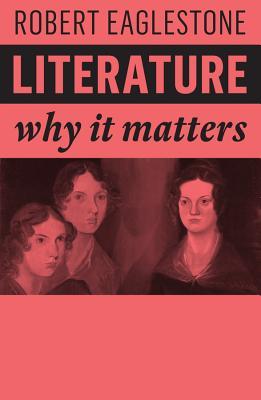
'Facts alone are wanted in life, ' exclaims Mr Gradgrind at the beginning of Dickens' Hard Times. Literature is not about facts alone, and - despite two and a half thousand years of arguments - no one can agree on what it is, or how to study it. But, argues Robert Eaglestone, it is precisely the open-ended nature of literature that makes it such a rewarding and useful subject. Eaglestone shows that studying literature can change who you are, turning you from a 'reader' into a 'critic' someone attuned to the ways we make meaning in our world. Literature is a living conversation which provides endless opportunities to rethink and reinterpret our societies and ourselves. With examples ranging from Sappho to Skyrim, this book shows how literature offers freer and deeper ways of thinking and being.
Author
Robert Eaglestone (born 1968) is a British academic and writer. He is Professor of Contemporary Literature and Thought in the Department of English at Royal Holloway, University of London. He works on contemporary literature, literary theory and contemporary European philosophy, and on Holocaust and Genocide studies. His work explores how literature ‘thinks’, especially in relation to issues of ethics. This was the subject of his first book, Ethical Criticism: Reading After Levinas, on literary theory and the philosopher Emmanuel Levinas. This focus on ethics broadened to a concern with ethical relationships to the past, centrally the Holocaust, other genocides and atrocities, in The Holocaust and the Postmodern. His work draws on memory studies and trauma studies, as well as on the thought of Jacques Derrida and Hannah Arendt. He works widely on contemporary literature, including Salman Rushdie and J. M. Coetzee and is the author of Contemporary Literature: A Very Short Introduction. In that book he writes: Literature thinks. Literature is where ideas are investigated, lived out, explored in all their messy complexity… Perhaps… ‘think’ is not the right word: ‘think’ is too limiting a description of the range of what a novel can do with ideas. In any event, the way literature thinks is bound up with what it’s like to be us, to be human. Literature is how we make ourselves intelligible to ourselves. And contemporary fiction matters because it is how we work out who we are now, today. He is also concerned with the teaching of literature, and has written the text book Doing English, a Guide for Literature Students; edits a series of books introducing major thinkers, Routledge Critical Thinkers, and is a commentator in the national press on literature teaching at school and in Higher Education. He lives in Brixton, London, and has two children.